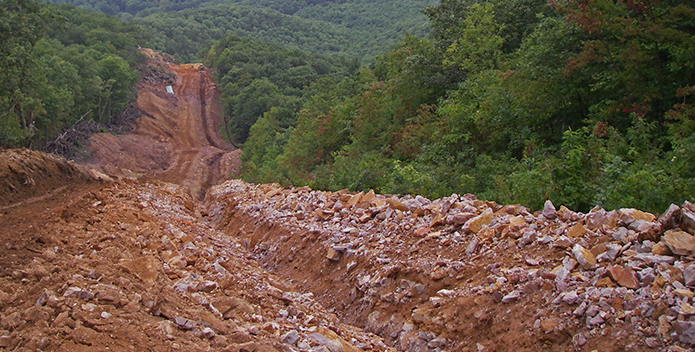The following was first published in the Free Lance Star.
Recent months have deluged Virginians with storms and heavy rainfall, causing flooded roads, washed-out embankments, and mudslides. In the case of Mountain Valley Pipeline construction, these summer storms triggered extensive damage to Virginia's rivers and streams.
The rampant erosion and muddy water gushing from pipeline work sites demonstrate what will happen on an even larger scale if the commonwealth continues to allow developers to dig trenches for vast pipelines across Virginia mountains without adequate protections.
In recent weeks, construction of both the Mountain Valley and Atlantic Coast pipeline was temporarily halted by the Federal Energy Regulatory Commission as permit after permit was proven inadequate to protect us from the damage of these pipelines.
The Mountain Valley and Atlantic Coast pipelines would each cut hundreds of miles through the heart of Virginia's most intact forests and steep mountains. The Atlantic Coast Pipeline alone would cross Virginia waters approximately 1,000 times. Most of these crossings are in the Chesapeake Bay watershed. Some waterways crossed by these pipelines are among the most pristine rivers in America.
Time is running out. This month offers a critical opportunity for Virginia to ensure that these mistakes are not continued and repeated.
The State Water Control Board is expected to hear public comments today and consider how to address the risks these pipelines pose to clean water in Virginia. The state can and must act to ensure protection of our precious water resources though its Clean Water Act authority.
The board has a powerful tool at its disposal to avoid further catastrophe: it can require careful reviews and protections for individual pipeline stream crossings, rather than the current one-size-fits-all permit.
Fears that pipeline construction would irreparably pollute Virginia waters have become a reality. Since developers broke ground on the Mountain Valley Pipeline early this year, we've already seen dozens of reports of harm and a notice of violation from the Department of Environmental Quality.
Descriptions of heavy rain aftermath range from a barely moored pipeline floating in its trench and mudslides shutting down a road in Franklin County to sediment pollution of a previously pristine spring.
Recent summer storms in southwest Virginia devastatingly demonstrated the continued failure of erosion controls. The north fork of the Roanoke River was inundated with murky sediment and runoff just downstream of a pipeline construction site.
But the problems don't stop at violations that harm our land and water. Virginia homes and businesses all along the route are also at risk.
One family in Giles County has already paid a heavy price. The Gallaghers, forced through eminent domain to give way to pipeline construction, came home after heavy rains to find their farm littered with rubble from pipeline construction and their basement flooded with eight inches of water.
Even after so many disasters in Mountain Valley's first months of construction, developers hope to soon begin bulldozing trees and trenching earth for the Atlantic Coast Pipeline. Fortunately, it's not too late to get on a path toward making things right for Virginians like the Gallaghers and for all of us who enjoy and rely on healthy rivers and streams.
With so many persistent concerns, the State Water Control Board last spring had the foresight to take a closer look at developers' plans and reopened public comment about certification for pipeline water crossings. The current generic water quality permit does not take into account the unique challenges at each proposed water crossing. This certification is simply inadequate to protect scores of waterways from pollution caused by pipeline construction.
The board has the authority to require individual crossing reviews and protections, at the very least for Virginia's most sensitive rivers, streams, and wetlands. These include waterways with threatened, endangered, or iconic species like brook trout and those with multiple proposed pipeline crossings.
In Augusta County, the Atlantic Coast Pipeline will cross the Calfpasture River and its tributaries 71 times, a certain blueprint for forever changing its character and water quality.
Individual reviews are a critical tool to ensure protection of the Commonwealth's waters for today's Virginians, and our children and grandchildren.
So much depends on the Board's decision—the health of our rivers, streams and wetlands, progress on Chesapeake Bay restoration, and the livelihoods of families and businesses who live in the path of construction and will have to bear the initial brunt of mudslides and waters overrun with sediment and construction debris.
The next hard rain is right around the corner. With the help of a small but important group of appointed citizens, Virginia has the power to protect each and every one of its treasured rivers and streams.
—Greg Buppert is a senior attorney for the Southern Environmental Law Center. Peggy Sanner is Virginia assistant director and senior attorney for the Chesapeake Bay Foundation. David Sligh is the conservation director for Wild Virginia.



